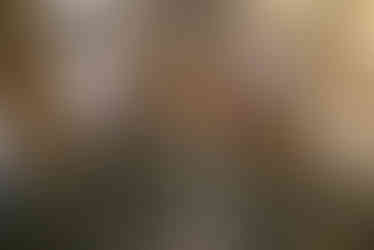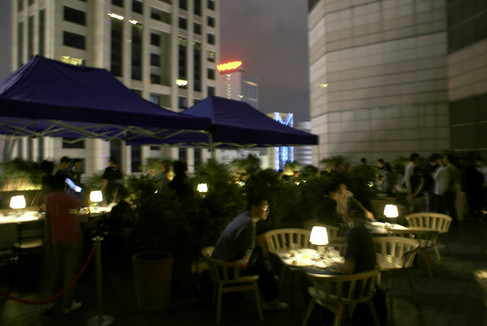AWW
- Jun Yue
- Apr 13, 2010
- 4 min read
Updated: Jul 11, 2022

Scroll down for the English version
他的名字在内地已经成了敏感词?!刚刚确认,确实如此,刚写完的博文却无法显示,只好将他的名字用AWW代替了。再一次证明我们的网络享有充分的自由,总还有些字能发出来,不容易啊!
最初知道他是通过一部叫做《童话》的纪录片,然后就是《老妈蹄花》。一般人其实并不知道他在艺术界的名气已经大得惊人,可是在他的心中,良心永远排在第一位。 昨晚在香港艺术中心听AWW和Vito Acconci的谈话。AWW被西方喻为中国当代艺术头号领军人物,而Vito Acconci是美国最著名的公共艺术大师之一。东西方两位艺术大师的灵感碰撞,当然不能错过。
讲座之后艾未未在铜锣湾时代广场一家餐厅请在香港推友吃夜宵,上百推友参加,大师果然慷慨。 在艺术中心一听完讲座我就快马加鞭的赶去铜锣湾,当然不是为了蹭饭,只是纯粹想向AWW表达一个公民的敬佩。作为一个闪亮耀眼的所谓“名人”,他能将良心永远放在第一位,并且能将良心付诸实施,即使受到各种阻挠也不放弃。
知道他的人都会觉得“闪亮耀眼”用的绝无半点夸张,虽然从他的外表上看不出来这一点。很多次向身边的人提起AWW,得到的确是摇头。 他是谁?他是著名诗人艾青之子,AWW1957年生于中国北京,1978年就学于北京电影学院,1981年就学于Parsons School of Design, Art Student League,美国纽约艺术家,1994年~1999年北京艺术家,1994年~2000年主编出版实验艺术刊物“黑皮书”(1994)、白皮书(1995)、灰皮书(1997),1998年至今“中国艺术文件仓库”艺术总监。
他被称为当代中国实验艺术领军人,他是在海外举办第一次观念艺术展的中国人,《北京人在纽约》副导演,也是北京奥运会“鸟巢”的中国顾问、还曾入选英国《艺术评论》杂志“全球当代艺术界最有影响力100人物”,并在华人艺术家中排名最高。 上述任何一个头衔,都让人感到光芒逼人。可现实生活中的AWW,一脸络腮大胡子,随意得有些邋遢的着装,思维中透露出的敏锐和自我使人很容易感觉到他的独特,尽管他看上去很不喜欢媒体形容他“特立独行”。
Has his name become a sensitive word in mainland China? I just confirmed that it is true. I just finished writing a blog post but it can't be displayed, so I had to replace his name with AWW. It proves once again that our intranet enjoys full freedom (irony intended), and there are still some words that can be sent out, which is not easy.
I first learned about him through a documentary called Fairy Tale, and then another documentary Laoma Tihua. The general public actually does not know that he has become incredibly famous in the art world, but in his heart, conscience always comes first. Last night at the Hong Kong Arts Centre, I listened to a conversation between AWW, who has been described in the West as the number one leader in Chinese contemporary art, and Vito Acconci, one of the most famous American masters of public art. The collision of inspiration between two masters of art from the East and West was certainly not to be missed.
After the lecture, Ai Weiwei invited his friends and fans in Hong Kong for a late dinner at a restaurant in Times Square at Causeway Bay. As soon as I finished listening to the lecture at the Art Center, I rushed to Causeway Bay, not to dine out, of course, but purely to express my admiration as a citizen to AWW. As a shiny and dazzling so-called "celebrity", he can always put his conscience first and put it into practice, even though he is obstructed in various ways, he will not give up.
Anyone who knows him would think that "shining and dazzling" is not an exaggeration, although it is not obvious from his appearance. Many times when I mention AWW to people around me, I get a shake of the head. Who is he? He is the son of the famous poet Ai Qing. AWW was born in Beijing, China in 1957, studied at the Beijing Film Academy in 1978, and at the Parsons School of Design, Art Student League in 1981, and was an artist in New York from 1994 to 1999. From 1994 to 2000, he edited and published the experimental art publications "Black Book" (1994), "White Book" (1995), and "Grey Book" (1997), and has been the artistic director of "China Art Document Warehouse" since 1998.
He is known as the leader of contemporary Chinese experimental art, the first Chinese to hold a conceptual art exhibition overseas, the assistant director of "Beijingers in New York", the Chinese consultant for the "Bird's Nest" of the Beijing Olympic Games, and one of the "100 most influential people in the world of contemporary art" of the British Art Review magazine. He is also a Chinese consultant for the Bird's Nest at the Beijing Olympics and has been listed in Art Review's "100 Most Influential People in Global Contemporary Art", the highest-ranking among Chinese artists. Any one of these titles makes people feel that the light is overwhelming. But the real-life AWW, with his bearded face, casual, unkempt dress, and sharp, self-conscious mind, is easy to sense his uniqueness, even though he seems to resent the media's description of him as a "maverick.
*On September 2, 2008, Ai Weiwei released a documentary named “Laoma Tihua” (老妈蹄花). It is about Ai’s experience in August when he was detained and beaten for attempting to testify during the trial of Tan Zuoren (谭作人), a Sichuan activist detained for “inciting subversion of state power”. The documentary has been widely watched and shared among Chinese netizens.
*Ai Weiwei's documentary Fairytale (2007) is a bold experiment. For the piece, Ai notoriously invited 1001 Chinese citizens of different ages and from various backgrounds to Germany, where the fair takes place, to experience their own fairytale for 28 days. The 152 minutes film documents the whole process, beginning with project preparations, and extending to all of the challenges that the participants had to face until their actual travel to Germany--as well as the ideas behind the artist's work.
发布时间:2010-04-13 20:13:39
本页链接:https://www.yuejun.org/post/meeting-up-with-ai-weiwei-in-hong-kong
































댓글